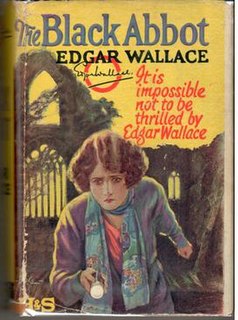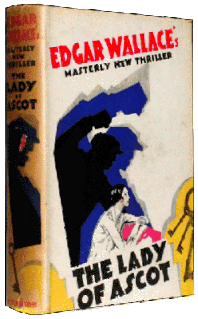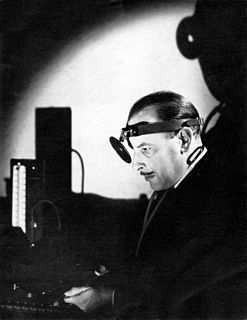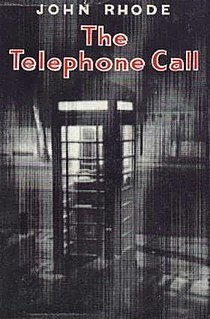Laburnum Grove is a comedy-drama play by the British writer J.B. Priestley which was first staged in 1933. It was one of Priestley's earliest hits. The play premiered at the Duchess Theatre on 28 November 1933. In its initial run it had over 300 performances. It made its Broadway debut at Booth's Theatre on 14 January 1935 and ran for 131 performances.
The Man Who Changed His Name is a mystery play by the British writer Edgar Wallace, which was first staged in 1928. A young woman begins to suspect that her wealthy, respectable husband may be an escaped Canadian murderer.

The Black Abbot is a crime novel by the British writer Edgar Wallace which was first published in 1926 about the ghost of an abbot haunting the grounds of an old abbey and protecting a lost treasure.

The Lady of Ascot is a 1930 crime novel by the British writer Edgar Wallace. It is a loose novelisation of Wallace's 1921 play M'Lady about a woman attempting to raise her daughter in high society whose plans are threatened by the return of her husband who has been serving a sentence at Broadmoor for the murder of a police officer.
Gillian Lind was a British stage, film and television actress. In 1930 she starred in Edgar Wallace's play On the Spot in the West End. She went on to enjoy a long career in film and television. Initially appearing onscreen as a female lead, she later transitioned into character roles. In 1957 she appeared in the BBC Dickens adaptation Nicholas Nickleby as the protagonist's mother. She featured on the 1964 series Ann Veronica based on a novel by H.G. Wells.
The Calendar is a 1929 play by the British writer Edgar Wallace. It is a crime thriller set in the world of horse racing world, the sport being among Wallace's interests. The protagonist is a financially struggling racehorse owner with a shady reputation. It premiered at the Palace Theatre in Manchester before transferring to Wyndham's Theatre in the West End.
The Mouthpiece is a 1930 crime play by the British writer Edgar Wallace. It was one of several theatrical failures written by Wallace following the enormous success of On the Spot, with a plot described as "flimsy".
The Old Man is a 1931 mystery play by the British writer Edgar Wallace. Its original production was staged at Wyndham's Theatre in London's West End for a ninety performance run. It is set entirely in the "Coat of Arms" tavern where a mysterious old man lurks in the background, reputedly an escapee from a lunatic asylum. The original cast included Alfred Drayton, Jack Melford, Harold Warrender and Finlay Currie.
Persons Unknown is a 1929 mystery play by the British writer Edgar Wallace. The plot revolves around the murder of a "person unknown" in a street by a mysterious blackmailer. It features the character of Sergeant Elk, a Scotland Yard detective who appeared in several of Wallace's novels.
M'Lady is a 1921 play by the British writer Edgar Wallace. It is a drama about a woman who tries to raise her daughter in high society, only for her husband to return from Broadmoor where he has been serving a sentence for killing a police officer. It was panned by theatre critics.
The Terror is a 1927 mystery thriller play by the British writer Edgar Wallace. It is based on Wallace's 1926 novel The Black Abbot.
Smoky Cell is a thriller play by the British writer Edgar Wallace first staged in 1930. In America a group of detectives hunt down a notorious racketeer.

Blondie White is a 1937 mystery play by British writer Jeffrey Dell and Bernard Merivale. A murder mystery, it was inspired by an earlier play by Hungarian writer Ladislas Fodor. A famous crime novelist helps Scotland Yard to solve the murder of a nightclub performer, Blondie White.

The Amazing Dr. Clitterhouse is a 1936 thriller play by the British writer Barré Lyndon. The lead character's name is a play on the term for the female sexual organ the clitoris - a name characterised by the "yearning, untrammelled nature" of Clitterhouse himself; an extremely daring pun for 1936, yet seemingly anticipated by Lyndon to escape the notice of the contemporary censor. "My view was that he was no more likely to locate the pun in my title as to locate the source of it on his beloved bedfellow", Lyndon 'Fragment of Autobiography'.

Settled Out of Court is a 1960 comedy thriller play by William Saroyan and Henry Cecil. It appeared at the Strand Theatre in London's West End with a cast including Nigel Patrick, Maxine Audley, Charles Heslop, Eric Pohlmann, John Stratton, Philip Guard and Mary Hignett. Patrick also directed work.

According to the Evidence is a 1954 comedy crime novel by the British writer Henry Cecil. An ex-army officer and a former criminal join forces to make sure that the man who killed a murderer is acquitted of murder himself.

Settled Out of Court is a 1959 comedy crime novel by the British writer Henry Cecil. It was published in the United States by Harper.

A Woman Named Anne is a 1967 comedy novel by the British writer Henry Cecil. The plot revolves around a divorce case involving a woman accused of adultery, who clashes with the lawyer ranged against her.

The Telephone Call is a 1948 detective novel by John Rhode, the pen name of the British writer Cecil Street. It is the forty seventh in his long-running series of novels featuring Lancelot Priestley, a Golden Age armchair detective. It was published in America by Dodd Mead under the alternative title Shadow of an Alibi. It is based on the real-life Wallace Case of 1931 in which William Herbert Wallace was convicted of murdering his wife Julia, a conviction which was later overturned on appeal.

Death on the Boat Train is a 1940 detective novel by John Rhode, the pen name of the British writer Cecil Street. It is the thirty second in his long-running series of novels featuring Lancelot Priestley, a Golden Age armchair detective. As in most of the later novels much of the detective footwork is done by Inspector Waghorn of Scotland Yard. The construction of the murder setting bears similarities to Death in the Tunnel, written by Street under his other pen name Miles Burton. With is focus on seemingly unbreakable alibis and railway and ship timetables, it is also similar in style to the Inspector French novels of Freeman Wills Crofts.










